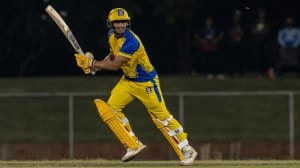RN Ravi keeps conflict with DMK simmering, objects to Tamil term for Union govt
Tamil Nadu governor says ‘ondriya arasu’, a term adopted by MK Stalin govt, ‘disrespectful’ and ‘politically overloaded’.
 Tamil Nadu Governor R. N. Ravi being accorded Guard of Honour before he attends the first session of the year of Tamil Nadu Assembly, at Fort St George, in Chennai, Monday, Jan. 9, 2023. (PTI Photo/R Senthil Kumar)
Tamil Nadu Governor R. N. Ravi being accorded Guard of Honour before he attends the first session of the year of Tamil Nadu Assembly, at Fort St George, in Chennai, Monday, Jan. 9, 2023. (PTI Photo/R Senthil Kumar) There seems to be no end in sight to the face-off between Tamil Nadu Governor RN Ravi and the DMK government, with the Governor now objecting to the state administration’s use of the term “ondriya arasu” to refer to the Union government.
Interacting with civil service aspirants on Tuesday, Ravi said the Tamil translation of “Union government” was “politically overloaded” and had a “disrespectful” tone. Using “Union government” is acceptable, according to him.
The DMK government insists on officially using “ondriya arasu” to refer to the Government of India to emphasise that India is a Union of states and finds “Central government”, which is “mathiya arasu” in Tamil, problematic. The Tamil Nadu government adopted “ondriya arasu” after MK Stalin took over as chief minister in May 2021. Though the AIADMK, the main Opposition party, and the BJP opposed the term, the government stuck to its guns and began referring to the Union government as “ondriya arasu” in official records and press releases.
On Tuesday, Ravi attributed political motives to the DMK government’s move when one of the civil service aspirants asked that the correct term was — Central government or Union government. He replied that there was no problem referring to the Government of India as the Union government as India is a union of states. But, he added, “the problem arises in Tamil Nadu because of the Tamil translation which is ondriya arasu”.
“Now, we know ‘ondriya (Union)’ is a structure or hierarchy that is below the district and below the sub-division. Then it is a political game of playing it down,” Ravi said. “You can use the term Union government without any fear. But when the translation is politically overloaded, it becomes disrespectful. Ondriyam is a lower-level structure and I think the intention (behind coining it) itself was disrespectful.”
The debate over “ondriyam (Union)” and “madhiyam (Central)” only exists in Tamil Nadu and was a “non-issue outside the state”, he added.
Reminding civil service aspirants to stand with the Union government during a conflict between the state and the Centre, Ravi said the key job of civil servants was to defend the government’s policies instead of being opinionated or behaving like activists.
The DMK did not react to the governor’s latest comments but on Wednesday DMK MLA TRB Rajaa raised a question about an alleged breach of privilege by a “guest” of the governor during Assembly proceedings on Monday. The Governor’s “guest” allegedly recorded Assembly proceedings using his mobile phone. Speaker M Appavu has referred the matter to the Committee of Privileges for its consideration.
The stand-off between the two sides has flared up since mainstream politics in the state has been linked to nationalism and sub-nationalism debates for decades. The Governor last week sparked a row when he suggested that Tamizhagam” was a more “appropriate” name for the state than Tamil Nadu, which was adopted in a 1967 Assembly resolution tabled by then CM and DMK founder CN Annadurai. Behind the Governor’s suggestion lay a misreading of the word “Nadu” that means “geographical boundary” or “land” but has come to mean “country” or “nation-state”. Ravi received backlash from the ruling party for suggesting the name change.
Then, on Monday, the Governor walked out of the Assembly when Stalin demanded that the original printed speech in Tamil be placed in records. Ravi had made changes to the speech prepared by the government. The governor stuck to his guns and on Tuesday another controversy broke out as it was reported that he sent out invitations for the Pongal festival with the Union Government’s logo rather than that of the state government. In the invitations, he referred to himself as “Tamizhaga Aalunar” or the governor of Tamizhagam.
- 01
- 02
- 03
- 04
- 05































